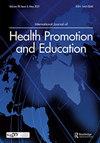Health promotion policy in Australian universities – a smoke-free policies case study
IF 0.7
Q3 EDUCATION, SCIENTIFIC DISCIPLINES
International Journal of Health Promotion and Education
Pub Date : 2023-11-12
DOI:10.1080/14635240.2023.2270978
引用次数: 0
Abstract
ABSTRACTEnsuring public spaces and institutions are healthy and encourage health promotion is an important public health initiative. Universities in Australia have begun to introduce policies that support health promotion activities. This study explores one such area of health promotion activity, the introduction of university tobacco policies. This research documents the aims of these policies, their development, and whether their implementation aligns with the stated goals. Policy and supporting documents were downloaded from the public facing websites of 23 Australian universities identified as having tobacco policy. Policies were analysed using a purpose-built policy and document analysis tool that allowed the examination of the motivations and processes behind the policy development and an exploration of consistencies across policy objectives. This research found that policy background and legislative obligations were clearly and uniformly stated, as were the smoke-free policy goals. Some universities provided clear policy intent, such as measurable goals or links between motivation, goals, and outcomes; however, many of the policies and supporting documents did not demonstrate key aspects of the policy process. This research should be encouraging for the increasing number of educational institutions that are developing health promoting policies, but it is also a timely reminder that policy development processes should be more transparent, documenting motivation and incorporating evaluation, to ensure they are fully understood and sustainable. This research reveals the need for further detailed policy analysis within the university setting and other organisational settings to better understand what sits behind the policy landscape visible through publicly available documentation.KEYWORDS: Healthy universitieshealth policyUniversityhealth promotionsmoke-free Disclosure statementNo potential conflict of interest was reported by the author(s).This research did not receive any specific grant from funding agencies in the public, commercial, or not-for-profit sectors.The article aligns with the scope of this journal as it highlights health promotion within the Australian tertiary sector and discusses, through policy document analysis, how and why Australian universities develop and implement smoke-free policies. Policy analysis is limited within the tertiary sector in Australia, and this research recommends the need for further policy analysis and stronger health promoting policy development that supports transparency, consistency and sustainability.澳大利亚大学的健康促进政策——无烟政策案例研究
保障公共场所和机构的健康,鼓励健康促进是一项重要的公共卫生举措。澳大利亚的大学已开始推行支持健康促进活动的政策。本研究探讨了健康促进活动的一个领域,即大学烟草政策的引入。本研究记录了这些政策的目标、它们的发展,以及它们的实施是否与既定目标一致。政策和支持文件是从23所被确定有烟草政策的澳大利亚大学的面向公众的网站上下载的。政策分析使用了一个专门的政策和文件分析工具,该工具允许检查政策制定背后的动机和过程,并探索政策目标之间的一致性。本研究发现,政策背景、立法义务、无烟政策目标均有清晰统一的表述。一些大学提供了明确的政策意图,例如可衡量的目标或动机、目标和结果之间的联系;然而,许多政策和支持文件没有展示政策过程的关键方面。这项研究对于越来越多正在制定促进健康政策的教育机构来说应该是令人鼓舞的,但它也及时提醒我们,政策制定过程应该更加透明,记录动机并纳入评价,以确保它们得到充分理解和可持续。这项研究表明,需要在大学环境和其他组织环境中进行进一步详细的政策分析,以更好地了解通过公开文件可见的政策景观背后的情况。关键词:健康大学健康政策大学健康促进无烟信息披露声明作者未报告潜在的利益冲突。这项研究没有从公共、商业或非营利部门的资助机构获得任何具体的资助。这篇文章与本杂志的范围一致,因为它强调了澳大利亚第三产业的健康促进,并通过政策文件分析讨论了澳大利亚大学如何以及为什么制定和实施无烟政策。政策分析仅限于澳大利亚的第三产业,本研究建议需要进一步的政策分析和加强促进健康的政策制定,以支持透明度、一致性和可持续性。
本文章由计算机程序翻译,如有差异,请以英文原文为准。
求助全文
约1分钟内获得全文
求助全文
来源期刊

International Journal of Health Promotion and Education
EDUCATION, SCIENTIFIC DISCIPLINES-
CiteScore
2.30
自引率
10.00%
发文量
69
 求助内容:
求助内容: 应助结果提醒方式:
应助结果提醒方式:


